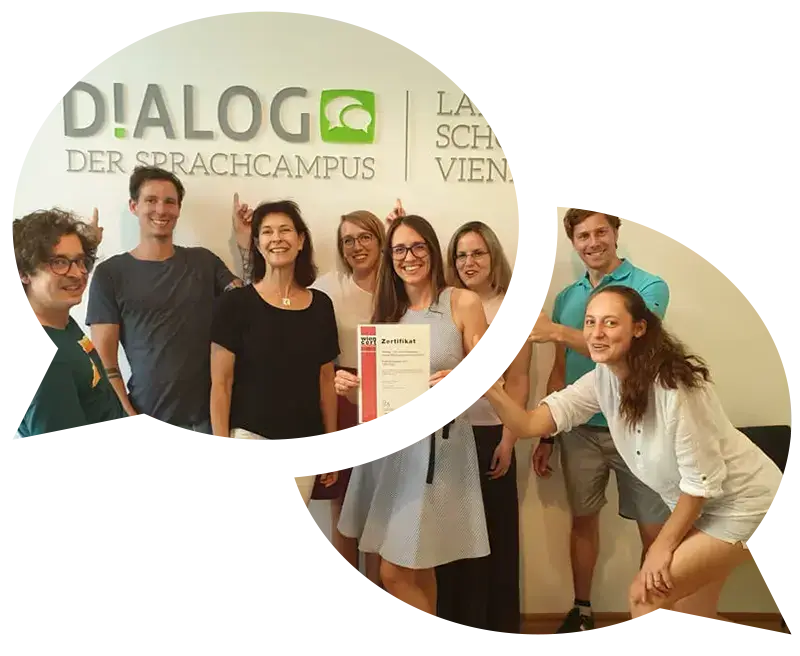The most important 17 points in four steps to find a good language school in Vienna:
- Find a language school Step 1: Internet research – Website and internet presence
- Reviews
- Accreditations and partners
- Find a language school Step 2: Practically – Location
- Group size
- Feel-good factor
- Personal service
- Financial factor
- Find a language school Step 3: Personal preferences – Course type
- Course duration and frequency
- Methodology
- Goals
- Motivation
- Exclusion factors
- Find a language school Step 4 : Nice-to-haves ;) -Authenticity
- Goodies
- Unique offers
Do you want to learn a new language? Then you should find a language school that suits you and your learning needs. We are all different types of learners and value different things. So you should ask yourself questions and do your research before deciding where to start your learning experience. Let’s go!
Find a language school Step 1: Internet research
1. Website and internet presence
First impressions count. This is the principle we follow when researching. What do you think of the website – appealing, modern and informative or boring, outdated and unclear? Are the information and prices presented transparently and comprehensively? Is there a website at all? Is it possible to contact the language school directly and easily? Are the pictures on the website authentic (really from the language school) or are they bought pictures?
Does the language school use social media? Look at the posts and photos – there are certainly reviews there, as well as on Google – see point 2.
2. Reviews
Take advantage of the experiences that learners before you have had! Read the reviews that are available online carefully, read the positive and also the critical comments and form an opinion. Are there enough reviews to take them seriously? This way you can probably rule out some language schools already. Now get to know the remaining ones, preferably during a personal visit.
3. Accreditations and partners
Excellent? Accreditations, i.e. seals of quality, such as wiencert or ö-cert in Vienna, can also be an indication of whether the language school offers high-quality courses with good service. The two mentioned are recognized quality tests on a high level, for which language schools have to fulfill and prove detailed quality criteria.
In addition, it can be interesting for you to know with which partners a school cooperates. Who are the corporate partners (= corporate clients who have their employees trained there)? To find a language school, you can check whether a school has any partners, how many there are and whether you know any of them. Sometimes there are also reviews directly from partners, which is a very good sign.
Find a language school Step 2: Practical factors
4. Location
The place to be. Ideally, you learn directly on site, in a country where the language is spoken. Then you can continue your training outside the course. The more centrally located the language school is in a city, the easier it is to explore and get to know it. If you already live, work or study in the city, it is of course practical if you can easily reach the school without having to travel 50 minutes ;). In principle, a location that is easily accessible by public transport is also recommended if you do not live in the immediate vicinity.
5. Group size
Small is good. That should be the motto in a group course. In groups of 15 people or more, it is difficult to actively participate and also to ask individual questions. Groups with a maximum of 10 participants are recommended.
6. Feel-good factor
With a smile to success. Often we are not aware of how important the environment and our personal well-being are for our learning success. You should feel comfortable in the language school, have fun learning and enjoy going there. It is best to visit the school in advance and get a first personal impression. If you are not sure, find out if the language school offers free trial courses.
7. Personal service
Personal service with heart, not being a number – this is also a big part of the feel-good factor. Does the office team take time to communicate with you? Are they friendly and helpful? Getting back to first impressions: Do they greet you in a friendly manner when you walk in the door? Do you feel like you’re being treated and advised with appreciation, or are you just number 500 who needs information today?
Additionally, you should also note if you already have to pay for consultation, possible placement/ cost estimates, etc. or if all of that is free of charge as part of the service.
8. Financial factor
Short on cash? Not everyone can afford courses easily. If this applies to you, research or ask directly at the language school whether there are financial aids available, e.g. through organizations or student discounts. Many language schools offer good opportunities and assistance in this regard. Find a language school that offers this and where you feel comfortable.
You think the courses are all too expensive, even though you can afford them? Most of the time you will find that the courses don’t seem that expensive anymore, especially when you consider that language schools also have to pay their staff, trainers, rent and so much more. ;)
Find a language school Step 3: Personal wishes
At this point you have to think about your individual wishes, which will help you to learn successfully or which are important for you personally – this is the only way to find your language school.
9. Course type
According to your likes. Do you want to learn in a group or alone with a trainer? Do you want to practice all skills (speaking, reading, listening, writing and grammar) or do you want to focus on writing, speaking or grammar? Do you want to do the course on-site or do you prefer online courses for more flexibility? Depending on this, you should find a suitable course type (intensive course, evening course, conversation course, grammar course, individual training, etc.).
10. Course duration & frequency
Time is a factor. How long should your course last? One week or half a year? How many times a week do you want to come to the course? How many hours per session do you want to learn (pro-tip: per day max. 3-4 hours in group courses or up to 2 hours in individual training).
11. Methodology
How do you learn best? Do you want a course with a lot of theoretical input and training or practical application and active exercises that focus on hands-on learning?
12. Goals
What are your learning goals? Do you want to get to the next level quickly (intensive course), do you need an exam to get a certificate? Or do you want to learn in a relaxed way for yourself and have enough time to review between sessions?
13. Motivation
What motivates you? Are you motivated by learning in a group, by achieving your own course goals set with your trainer, or are you motivated by seeing your progress reflected in your job/study? Is it important for you to get regular feedback from the trainer, does critical feedback or praise motivate you? What kind of exercises (e.g. written grammar exercises or rather teamwork, presentations, video- and online-supported learning etc.) motivate you to continue learning?
14. Excluding factors
Are there any excluding factors for you? Things that don’t work for you from experience or that you personally can’t or won’t accept? If there are, talk to the language school team to make sure you will not encounter these in the course.
Find a language school Step 4: Nice-to-haves ;)
15. Authenticity
Authentic? Is it important to you to learn directly in the country with native speakers who know the country and also the culture/dialect? Then you should make sure that the teachers are native speakers and come from the country. In addition, it might be relevant for you if there are additional offers, e.g. dialect workshops, to get to know the culture even better.
16. Goodies
A little extra is always good. Does the language school offer additional free goodies? Learning aids, blogs or other learning tools, social events or additional workshops with practical language application? These may not be primary items, but they can greatly contribute to your learning success and also to socializing with other learners.
17. Unique offers
The Unique Factor. Does the language school offer courses that no other school does? Exceptional experiences that you can’t get anywhere else? Language schools that have unique offers also often excel in the creativity and innovation of their instructors, which in turn has a positive impact on course quality.

Zu kompliziert? Wir können helfen!
Melde dich jetzt für einen Deutschkurs in Wien an und lerne effektiv Deutsch in Kleingruppen und mit hochqualifizierten Lehrkräften.
There are many points to consider when trying to find a suitable language school. If in the end you can’t decide between two schools, here’s one last tip: trust your gut feeling ;)
If you would like to get to know DIALOG as a language school and try out the above points right away, click here to start at point one. Have fun and success!
February 2023



